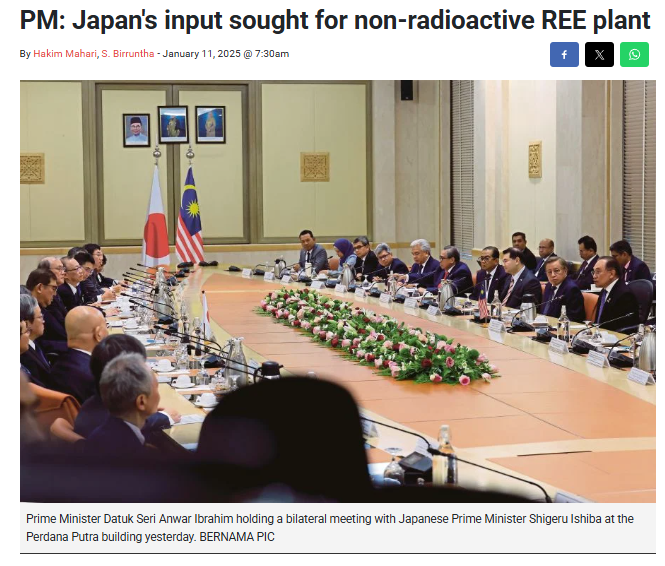
Prime Minister Datuk Seri Anwar Ibrahim has confirmed that Malaysia is seeking Japan's involvement in developing a non-radioactive rare earth element (NR-REE) processing plant.
"I mentioned to (Prime Minister Shigeru Ishiba) that Malaysia is looking to involve Japan in the development of the non-radioactive rare earth element processing plant," he said in a joint press conference with his Japanese counterpart.
While specific details of Japan's involvement remain undisclosed, the initiative reflects Malaysia's broader ambitions in the REE sector.
Malaysia holds an estimated 16.1 million tonnes of non-radioactive REEs, valued at RM800 billion, which positions the country as a key global supplier of these critical materials.
Resources and Environmental Sustainability Minister Nik Nazmi Nik Ahmad reportedly said Malaysia had great potential in the downstream rare earth elements industry as a super magnet-producing country, particularly to support the electric vehicle manufacturing industry's growth.
On Nov 28 last year, Economy Minister Rafizi Ramli underscored the importance of Malay-sia's east coast region in becoming a hub for large-scale industries and REE.
Rafizi, who spoke at the East Coast Economic Region Development Council forum, identified REE as a largely untapped resource with immense potential for economic growth over the next 10-15 years.
Meanwhile, economists and industry experts have praised the move while highlighting challenges.
Doris Liew, an economist with IDEAS Malaysia, said: "The potential rewards are significant.
"In addition to the RM800 billion in direct economic valuation, the REE sector could generate over 6,000 jobs, with additional economic spillover effects from capital investments, asset acquisition, and the construction and maintenance of extraction and processing facilities.
"Japan is a global leader in producing high-tech materials, including magnets, catalysts and electronic components.
"Collaborating with Japan could strengthen Malaysia's domestic REE processing industry, further mitigating the risks associated with over-reliance on Chinese supply chains and enhancing global supply chain resilience for these critical materials," she said.
Institute of Strategic and International Studies (ISIS) analyst Qarrem Kassim highlighted the alignment of this initiative with Malaysia's National Industrial Master Plan 2030.
"REEs are essential for modern technologies, including semiconductors, EV batteries and defence systems.
"A stable domestic supply could attract more investments in downstream industries such as permanent magnets and battery manufacturing," he said.
However, Qarrem also acknowledged environmental and policy concerns.
"Malaysia must ensure that any investment in the REE sector includes local processing to foster high-value industries rather than merely exporting raw materials.
"This approach could position Malaysia as a neutral alternative to global supply chain dominance," he added.
Universiti Kuala Lumpur Business School's Associate Professor Aimi Zulhazmi Abdul Rashid highlighted the need for environmental sustainability.
"The biggest threat to Malay-sia's environment is the unmitigated effects of rare earth processing plants. Research and development (R&D) is essential to address this issue," he said.
Aimi also stressed the importance of technology transfer from Japan.
"The value-added products from rare earth must have production and R&D bases in Malaysia. The supply chain must be developed domestically, with SMEs playing a prominent role as participants.
"If executed strategically, the rare earth industry could position Malaysia as a key global player. It would also provide strong bargaining power for Malaysia during geopolitical crises."


